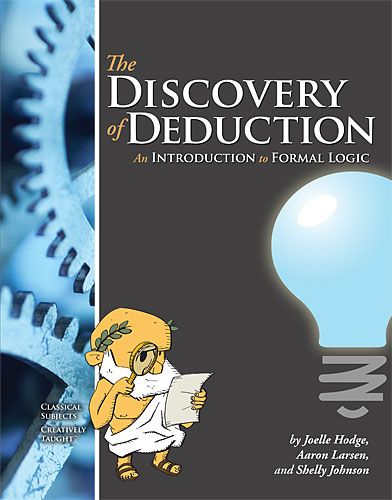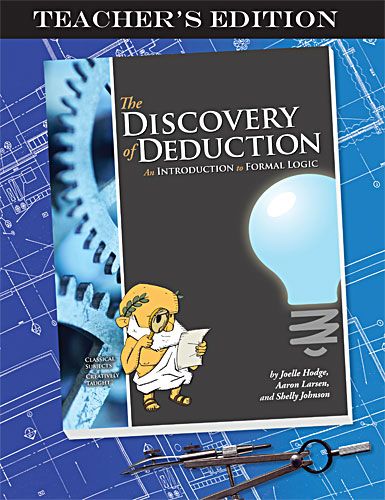
Since I discovered Classical Academic Press through the Schoolhouse Review Crew a few years ago, I have added just about everything CAP to my curriculum, including Latin, Greek, Bible, Spanish, and Logic. Because we were fortunate enough to review The Art of Argument last year, I was thrilled to review The Discovery of Deduction: An Introduction to Formal Logic for the last month or so. We also received and used The Discovery of Deduction Teacher's Edition.
While The Art of Argument is a course in informal logic, and was therefore a perfect starting point for Therese as she embarked on logic last year, The Discovery of Deduction is a course in formal logic, and has lined up perfectly with her first forays into Geometry this year. At 11, some people might find her too young for both courses, but as I intend for her to take the PSAT next year in 7th grade (her official grade, if not her actual grade), I have loved the opportunity to introduce her to proofs through both formal logic and Geometry. Classical Academic Press makes it entirely possible for an 11 year old to take and enjoy this course, although they say that it is geared toward "students as young as 8th grade." Since Therese's curriculum is 8th/9th grade, I would say that estimate is dead-on.
What The Discovery of Deduction Is


The Discovery of Deduction teaches students the art of deductive reasoning. By using syllogisms, or a major premise, a minor premise, and a conclusion, formal arguments can be made. Deductive reasoning focuses on the structure of the argument rather than on the correctness of the conclusion. If the structure of the argument is sound, the conclusion is, a priori, correct.
The book is structured similarly to The Art of Argument, for those familiar with that book. Socrates continues to teach his students, and the included dialogues make a great teaching tool, as they break up what could become monotonous (from the point-of-view of the student) reading. The chapters themselves are broken into manageable "chunks", i.e., 2.1, 2.2, etc. There is no average number of subdivisions within chapters, though, so you can't just assume that each chapter will take the same number of weeks to cover. In general, and depending, of course, on the individual student, it seems reasonable to cover one subdivision per day that Logic is done in school. To see a sample chapter, visit Classical Academic Press.
The Teacher's Edition is a mirror copy of the Student Book, except for the fact that it has the answers typed in (there are questions at the end of each chapter subdivision - see the sample linked above) and occasional sidebar notes to the teacher/parent. A sample of the Teacher's Edition is also available.
Therese and Formal Logic
I am not shy about admitting that teaching Therese things like Logic is one reason that I relish homeschooling. I have a minor in Philosophy from a Catholic school. I know Formal Logic! I also have a PhD in a Social Science. I know the need for rigorous deductive reasoning and why inductive reasoning can lead to bad science. Therese has been subjected to my lectures on such things since she was an infant (no, really - in fact, her pediatrician thinks it is likely that one reason that she was preternaturally verbal at a ridiculously young age is that I talked to her all the way through my dissertation. She was there, and so I talked to her while I worked. Maybe she just wanted to join the conversation. Mortimer Adler would have been delighted.).
In any case, Classical Academic Press teaches the way I teach, which is why I am willing to cede my teaching authority to them. Therese had fun with The Art of Argument, a course she was happy to complete, even after our review period was up last year, so she was ready for The Discovery of Deduction. Because she is younger than the recommended age, and because Formal Logic can be hard, I read the material to/with her. We did Logic two or three times per week, usually for about 40 minutes each time, depending on how difficult the material was that day. If there was a dialogue, we each took parts. After reading the material and ascertaining that she understood it, I assigned her the questions at the end of the section. When she had completed them, we went over the answers together.
I really love this program. It continues the CAP Logic series perfectly. Everything about CAP is always laid out so perfectly, allowing plenty of flexibility for a homeschool parent, but giving them everything they need to teach with no prior knowledge of a subject. I was a little surprised that Therese didn't love it as much as I did. She liked it, but she didn't run to do it like she did The Art of Argument. I attribute that not to some inherent flaw in the program (she *does* run to do CAP's Latin, Greek, and Spanish, and she was sad when she finished The Art of Argument), but to the fact that Formal Logic is a difficult subject. Also, as I am sometimes forcibly reminded, she is 11. Sometimes when I beg her to act her age, I have to remember that she probably is!
Having said that, she is still working through the program and will continue to do so. Although the material is challenging, it is presented in a comprehensible manner (again, recommended for 8th grade and up) and, especially with the Teacher's Edition used, too, it is well within reach of any parent and student.
Final Thoughts
Formal Logic is not one of those classes that only smart kids should take. It's not one that only college-bound kids should take. Everyone should take this class. It teaches you how to think. It teaches you how to structure arguments. It teaches you to become a better writer. I firmly believe that if you can write well, you can write your own ticket in this world. Therese may not be a huge fan yet, but she'll be amazed when she gets to college (when most kids have their first, if they ever have any at all exposure to this subject) and takes Formal Logic and realizes how far ahead of the game she is. Now, it's a heck of a lot harder in college, given that there are 256 possible forms of syllogisms, but even knowing the terms is a big head start. Given everything that Formal Logic can do for you, The Discovery of Deduction is a steal at $26.95 for the Student Edition and $29.95 for the Teacher's Edition. Did I mention that it's *fun*?
The Crew reviewed CAP's The Art of Argument and Poetry this time around as well, so be sure to click the banner below and read all the reviews!


No comments:
Post a Comment